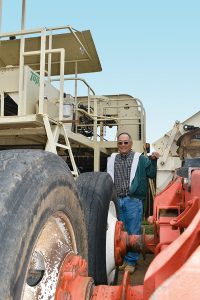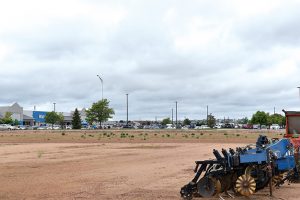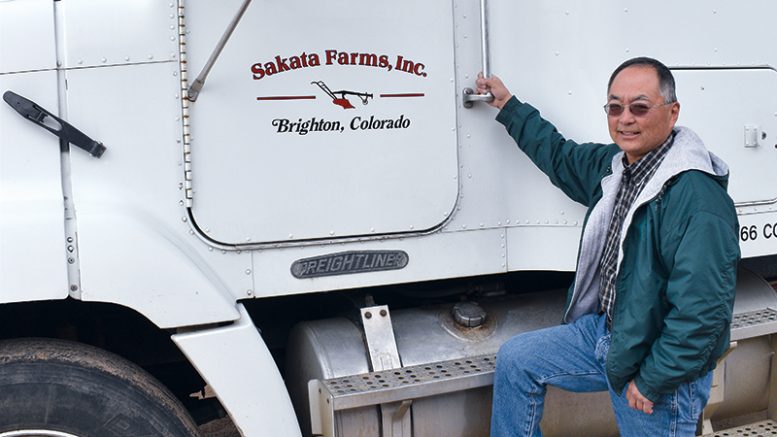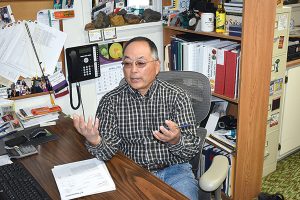Story and photos by Dave Alexander, Publisher
Brighton, Colorado, onion grower Robert Sakata is no stranger to the bright lights. In May, Sakata hosted a grower roundtable at his farm with Colorado Gov. John Hickenlooper and none other than the U.S. Secretary of Agriculture himself, Sonny Perdue.
Sakata Farms was selected as part of Perdue’s “Back to Our Roots” tour, and though unexpected, it was not really that much of a surprise considering Sakata’s previous contributions and advocacy work. In 2014, Sakata was selected to be on a small panel that met with Vice President Joe Biden, and earlier this year he also hosted top FDA officials for a day.
Sakata said that these opportunities came about through networking in the nation’s capital and connections he has made through the years. Nearly every year, he travels to Washington D.C. to lobby on behalf of the Colorado Fruit and Vegetable Growers Association, a group he founded and serves as president. Sakata also serves on the Colorado Onion Association board. One thing is for sure; Sakata is an advocate for the agriculture industry.
Sakata says that his interest in the political side of ag was spawned by his father, Bob. Bob, held in a World War II Japanese internment camp when only 15 years old, went on to build Sakata Farms into one of the largest farms in Colorado. Bob was so successful that the Emperor of Japan wanted to meet him and visited the farm in 1952.

Robert “R.T.” Sakata grows 500 acres of onions and 2,000 acres of field corn and pinto beans 30 miles north of Denver.
Not So Sweet
Though the Sakata family may be accustomed to the spotlight, one side of their operation dimmed this year. In March, Sakata Farms auctioned off its sweet corn processing equipment, marking an end to decades of sweet corn production.
The last farm in the area supplying the Denver area with fresh corn, Sakata said it was a melancholy and tough decision to eliminate the crop that his dad started growing in 1944. The main reasons for the decision were a lack of local labor due to a sub-3 percent unemployment rate and the escalating costs of using workers from Florida for harvest.
Brighton is only 30 miles from Denver. In 2017, the Greeley area, only 30 miles north of Brighton was ranked third in the U.S. for percentage growth among metropolitan areas. Explosive growth in the area has created a housing shortage. Even people that live in the area 12 months a year have a hard time finding affordable housing. Sakata was housing his seasonal workers in hotels and paying for their transportation to and from Florida.
Overhead on the crop was compounded by refrigeration equipment and maintenance. Sakata also faced depressed prices and a short timeframe to market the crop. Sweet corn had become untenable and was no longer profitable.

Sakata Farms nearly emptied its storage yard after selling off the farm’s sweet corn equipment. Neighboring Wal-Mart has not asked to buy it yet for more parking.
The Squeeze
The housing shortage on Colorado’s Front Range has created other challenges for Sakata, too. Housing developments are pressed up against his fields, encroaching closer all the time. Without a buffer zone between fields and houses, aerial application of pesticides became impossible. Not being able to spray for earworms was also a contributing factor in dropping sweet corn from Sakata’s rotation, which is now onions, field corn and pinto beans.
In addition to shrinking buffer zones, the boom in population to Brighton’s semi-arid desert brings water challenges. Faced with the FDA’s proposal requiring growers to test for E. coli four times a year and meet recreational water standards, Sakata said his main water risk is from what humans are doing. In other parts of the country, livestock and wildlife may affect water quality, but Sakata lives downstream from 2 million people. Some of the water he uses to furrow- and pivot-irrigate comes directly from a new wastewater treatment plant.
During the FDA’s visit, Sakata’s main goal was to make the representatives aware that not all farms are the same. Sometimes water is not even available for testing.
The Long Haul
Despite the challenges of growing amidst urban sprawl, labor shortages, water issues and offers to buy his ground for development, Sakata is not going anywhere. He enjoys farming and the lifestyle. But Sakata admits “growing corn was stressful.” It is a huge commitment in equipment, refrigeration and labor. He is looking forward to spending more time and committing more acres to growing onions this year. Working with Colorado State University, he is trying some early onions for the first time since he doesn’t have to deal with corn.
Last year was a good one for Sakata’s onions. Quality was good and they shipped reds, whites and yellows all over the country. Auctioning off the corn processing line has freed up room and will allow Sakata to modernize his onion equipment.
“Christopher Columbus brought over our onion grading line, and we are due for an upgrade,” he quips.
SLIDESHOW: Ag Secretary Sonny Perdue’s visit to Sakata Farms
Hover over each picture for a description
USDA photos by Lance Cheung.
[slideshow_deploy id=’1425′]


